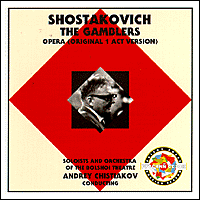REVIEW 
SHOSTAKOVICH
The Gamblers, Opus 63
(1941-2)
Nikolai Kurpe, tenor (Ikharyov); Nikolai Reshetniak,
baritone
(Utyeshitelny);
Alexander Arkhipov, tenor (Krugel); Mikhael
Krutikov, bass (Shvokhnyev);
Vyacheslav Pochapsky, bass
(Alexei); Pyotr Gluboky, bass (Gavryushka)
Bolshoi Theatre
Orchestra cond. Andrei Tchistiakov
Harmonia mundi RUS 288115
[47:35/DDD]
The Gamblers, with which Shostakovich
whiled away 1942, must rank as one of the most elaborate compositional whims
ever
perpetrated. Not only would the subject - the tawdry scams of a gang of
provincial cardsharps - have been hopelessly beyond the pale so far as Soviet
theatres were concerned, but the completed opera would have run for over four
hours. (True to his respect for every syllable Gogol ever wrote, Shostakovich
refused to cut a word from the original play.) In the end, the composer realised
that he was toying with a private interest of no public viability whatever, and
regretfully abandoned it. In that The Gamblers contains quite a bit of
prime Shostakovich, this is a shame; yet one can only agree that his very
personal obsession with Gogol was unlikely to sustain an audience's interest in
an all-male tale of seedy deceit for three hours, let alone four. Reckoning on a
more realistic duration, the Polish composer Krzysztof Meyer has attempted to
complete the opera with a running-time of just over two hours [Capriccio
606062-2] Sadly his effort makes it clear that only Shostakovich knew what he
was
up to in this work and anyone trying to emulate him is bound to fail.
For
instance, only someone with Shostakovich's very idiosyncratic irony would set
the
words "Adelaida Ivanovna" (the name, bequeathed it by its doting owner, of a
marked pack of cards ) to an inflatedly portentous crescendo, or turn a
discussion about cheese into a lofty pseudo-baroque recitative. Shostakovich's
delight in Gogol's ne'er-do-wells - and, in particular, the writer's paradoxical
elevation of mundanity and cliché - produces some very funny, not to
mention brilliantly scored, "scoundrel music". Yet there are puzzling moments,
too. Why (in the bass duo between Alexei and Gavryushka) does he make nothing of
the pregnant line "in two provinces at once"? What made him take the ostinato of
Gavryushka's idiotic balalaika song and develop it in the last of his Preludes
and Fugues, Opus 87? Is it coincidence that a cadence in the final surviving
scene (Scene 4, 14:43 et seq.) turns up a year later in the finale of the Eighth
Symphony? One hopes that Russian scholars with access to Shostakovich's
manuscripts - such as Manashir Yakubov - will one day be able to enlighten
us.
Meanwhile, this performance, made in Moscow in March 1995, fills a
fascinating, albeit minor, hiatus in Shostakovich's CD discography - and, for
the
most part, effectively. The singers are uniformly good, the orchestra likewise
(if backwardly balanced). Some passages, particularly in the latter stages of
Scene 4, tend to drag, the stylised tedium of Gogol's monologues finding
inadequate variation in Shostakovich's accompaniment. Likewise, pacing could be
spritelier and more pointed at times. Yet there's more than enough here to part
dedicated Shostakovich devotees from their money. (The package contains a
translation but no transliteration.)
Back to Shostakovich CDs. Back to Reviews. Back to Contents.
